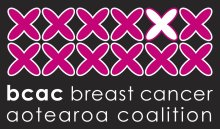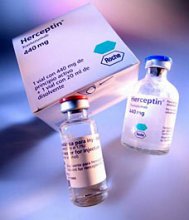Latest News
Before you start treatment, you will need to decide who will make up your medical team.
Your team of cancer specialists could include:
- a surgeon
- a breast care nurse
- a medical oncologist
- a radiation oncologist
You will probably be referred to a surgeon in the first instance. Make sure you feel comfortable with this person. Things to consider include:
Receiving a diagnosis of breast cancer can be challenging and frightening.
On these pages, you'll find more information about how to cope with and understand your diagnosis. We hope this will help you to make informed decisions about your treatment programme.

11 August 2008
The Breast Cancer Aotearoa Coalition (BCAC) issued the following statement in response to issues raised in the current Herceptin debate:
Media Release from Dr Richard Isaacs, Medical Oncologist, Palmerston North and ANZ Breast Cancer Trials Group, Chair Breast Cancer Special Interest Group of the New Zealand Association of Cancer Specialists and Associate Professor Fran Boyle, Medical Oncologist, University of Sydney and ANZ Breast Cancer Trials Group.
12 August 2008

01 September 2008
The UICC (International Union Against Cancer) World Cancer Congress held last week in Geneva provided breast cancer advocate Dr Chris Walsh with a platform to present the plight of NZ women needing Herceptin to the international oncology community.
Dr Walsh explained that the NZ drug funding agency PHARMAC considers 9 weeks Herceptin good enough and refuses to fund the international standard 12 months. She told delegates that New Zealand women diagnosed with early stage HER2 positive breast cancer are mortgaging their homes to pay for Herceptin.

October 23, 2008
John Key’s announcement today that a National-led government will fund 12 months of Herceptin could bring immeasurable relief to women and their families affected by early stage HER2 positive breast cancer.
The National health policy has brought new hope to Herceptin campaigners who have battled PHARMAC with petitions and legal proceedings in unsuccessful attempts to overturn the current situation of funding for only 9 weeks of treatment. Twelve months of Herceptin is the current standard treatment publicly funded for women in 33 other countries.

10th December 2008
The government’s announcement it will provide funding for 52 weeks of the breast cancer drug Herceptin means Christmas will come early for hundreds of New Zealand women with Her2 positive early breast cancer and their families.
Libby Burgess, chair of the Breast Cancer Aotearoa Coalition says the decision comes as a huge relief for the women of New Zealand.
‘It is wonderful that the government has acted so quickly, alleviating the stress and anxiety of women whose best chance of long term survival depends on receiving this clinically proven treatment.’

28 May 2009
The Breast Cancer Aotearoa Coalition (BCAC) applauds the Government’s move to boost funding for healthcare as part of Budget 2009.
The Finance Minister, Bill English, announced today that an additional $3billion would be invested in health over the next four years. This includes new money for subsidised medicines and elective surgery.
The chairperson of BCAC, Libby Burgess, says the funding boost for health will make a real difference to the lives of many people.

12 August 2009
The Breast Cancer Aotearoa Coalition (BCAC) believes new national guidelines on the management of early breast cancer will help to save lives.
The New Zealand Guidelines Group today released the Early Breast Cancer Guidelines at the inaugural National Maori Cancer Forum in Rotorua.
BCAC chairperson, Libby Burgess, says the guidelines set out national standards for breast cancer care in key areas such as surgery, radiation therapy, chemotherapy and psychosocial support.



